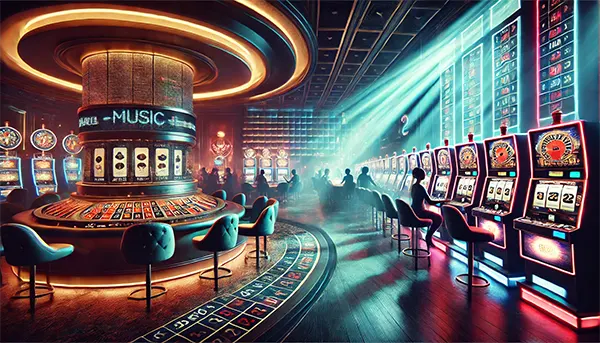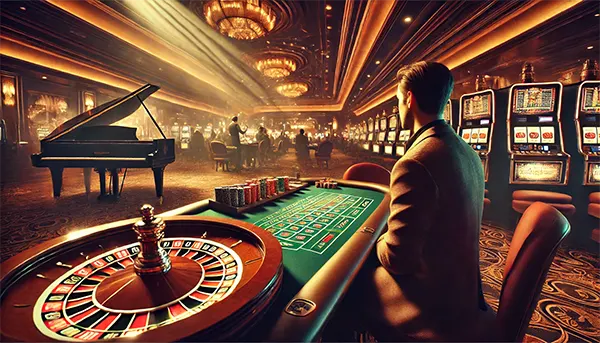How Music Influences Risk-Taking in Gambling: A Scientific Perspective for 2025

Music has always played a crucial role in shaping human emotions and decision-making. In the gambling industry, soundtracks are not merely background noise but a strategic tool used by casinos to influence player behaviour. Recent studies in 2024-2025 have provided deeper insights into how different music genres affect betting patterns, risk tolerance, and overall gambling strategies.
The Psychological Impact of Music on Gamblers
Music has a profound psychological effect on individuals, altering emotions and influencing cognitive processes. In gambling environments, music is carefully selected to enhance engagement, sustain interest, and sometimes even encourage higher risk-taking behaviour. Fast-paced music is known to increase adrenaline levels, prompting quicker decision-making and bolder bets, while slow, ambient tunes can create a more calculated and cautious approach to gambling.
Recent neurological studies indicate that upbeat music stimulates dopamine release, creating a sense of excitement and urgency. This heightened emotional state often leads to impulsive betting patterns, where players are more willing to take risks. On the other hand, slower melodies activate a more reflective and strategic mindset, allowing players to consider their choices more thoroughly.
Additionally, different cultural backgrounds influence how individuals react to specific musical cues. Research in 2025 suggests that gamblers from Western countries tend to associate high-tempo music with action and thrill, whereas players from East Asian cultures respond more favourably to melodic harmonies, which encourage patience and prolonged gameplay.
How Casino Soundtracks Shape Player Decisions
Modern casinos meticulously craft their sound environments to maintain an immersive experience. Every aspect of the music—tempo, pitch, volume, and repetition—plays a role in guiding player behaviour. Many land-based casinos use loops of instrumental music that subtly increase in speed during peak gaming hours to sustain excitement and encourage extended play sessions.
Online casinos have also adopted advanced auditory strategies, integrating adaptive music that changes based on user activity. Studies in 2024 revealed that players exposed to dynamic music systems—where the tempo shifts according to betting streaks—tended to engage in longer gambling sessions compared to those experiencing static background music.
Furthermore, certain sound effects, such as coin jingles and celebratory tunes, are engineered to reinforce reward responses. This phenomenon, known as “audio reinforcement,” triggers a psychological loop that keeps players engaged, often leading to prolonged gambling sessions.
The Role of Tempo in Risk-Taking
The tempo of music has a direct correlation with a gambler’s willingness to take risks. Fast beats elevate heart rates, simulate excitement, and create a sense of urgency, which can push players towards making rapid and sometimes reckless bets. Slow-tempo music, on the other hand, reduces stress levels and fosters a more analytical approach.
Experimental studies from early 2025 analysed gambling behaviour in different musical conditions. Participants who played in an environment with fast-paced electronic music placed 37% higher wagers compared to those exposed to slow classical compositions. This demonstrates the significant impact that sound speed has on financial risk-taking.
Casinos strategically use tempo shifts to manipulate betting behaviour. For example, during jackpot rounds, slot machines often accelerate their background music, increasing excitement and encouraging players to continue spinning. In contrast, VIP rooms in high-stakes casinos frequently employ soothing jazz or classical melodies to promote thoughtful, strategic betting among experienced gamblers.
Why Online Casinos Invest in Music Engineering
The rise of online gambling has prompted digital casinos to refine their music strategies. Unlike traditional venues, where a live atmosphere plays a role, online platforms rely solely on visual and auditory stimulation to create an engaging experience. Many leading online casinos now collaborate with music psychologists to design tailored soundscapes that optimise user engagement.
Recent trends show an increase in personalised gaming soundtracks, where players can adjust music settings based on their preferences. This not only enhances enjoyment but also allows casinos to experiment with different auditory stimuli to observe behavioural patterns. Some online platforms have even introduced AI-driven music algorithms that adapt in real-time to match betting habits.
In 2025, the focus on immersive audio experiences is stronger than ever. With virtual reality (VR) gambling gaining traction, developers are exploring 3D audio environments that mimic real-world casino acoustics, making the gambling experience more lifelike and psychologically persuasive.

Ethical Considerations and Player Awareness
While music in gambling serves as a tool for engagement, ethical concerns have been raised about its influence on vulnerable players. The deliberate use of sound to encourage risk-taking has sparked debates among researchers and responsible gaming advocates. Regulators are increasingly scrutinising the role of audio manipulation in online and land-based casinos, pushing for transparency in auditory design.
Player awareness is crucial in mitigating the subconscious effects of music. Some responsible gambling initiatives now include educational content on how music influences decision-making, helping players make more informed choices. Additionally, certain casinos have started offering sound settings that allow players to minimise or mute background music to reduce potential bias.
As technology advances, the conversation around ethical gaming practices will continue to evolve. The challenge lies in balancing immersive entertainment with responsible gambling measures, ensuring that music remains an engaging element rather than a manipulative force.
Future Research and Innovations
The intersection of music psychology and gambling behaviour remains an evolving field. Future studies will likely focus on neurobiological responses to different sound frequencies, further refining our understanding of how music affects risk perception. As AI continues to develop, adaptive music systems in gambling environments may become even more sophisticated.
Casino operators and regulators must stay ahead of these advancements to maintain ethical standards while leveraging the power of sound for entertainment. Ultimately, awareness and responsible implementation will determine how music continues to shape the gambling experience in years to come.
